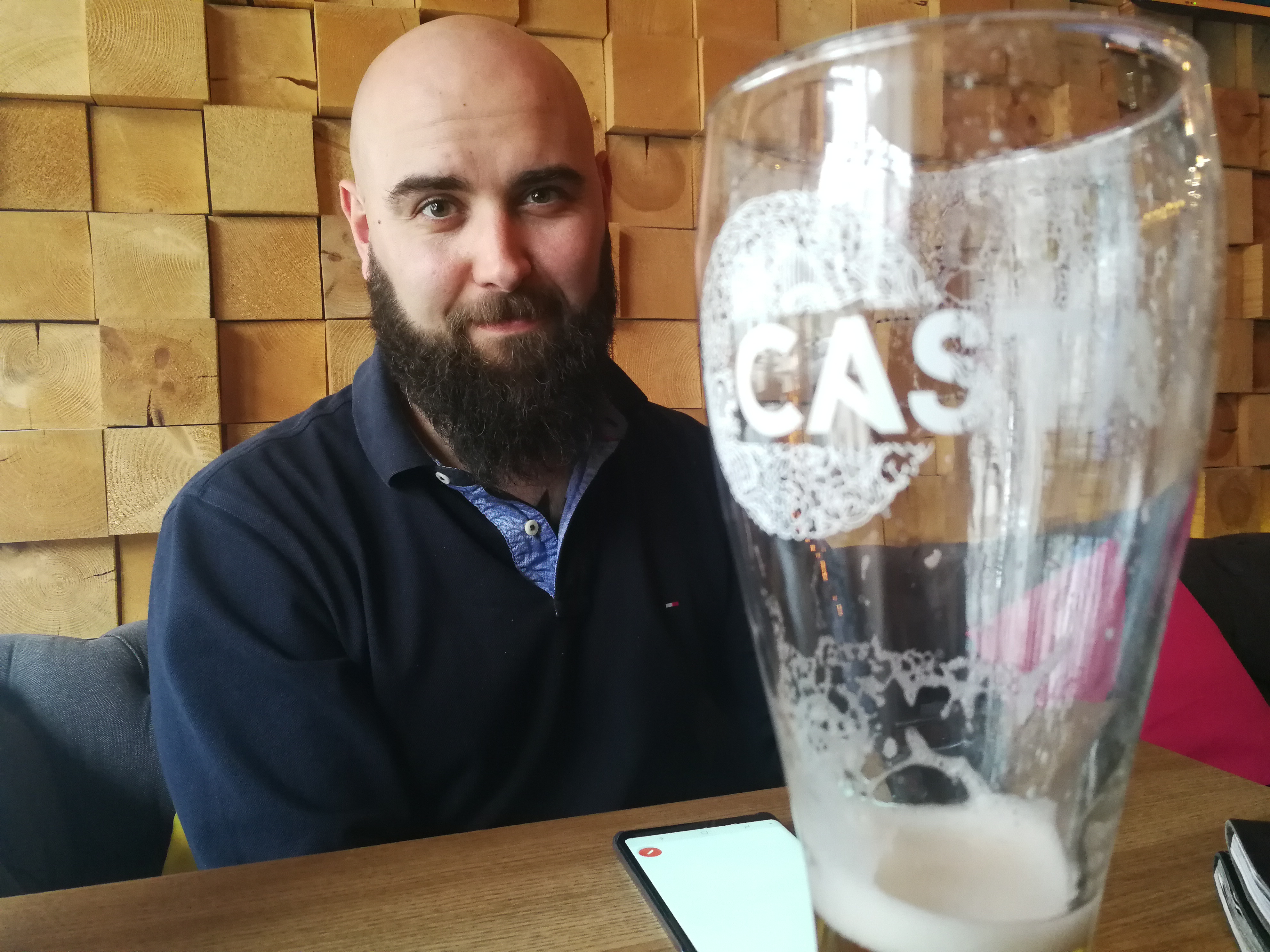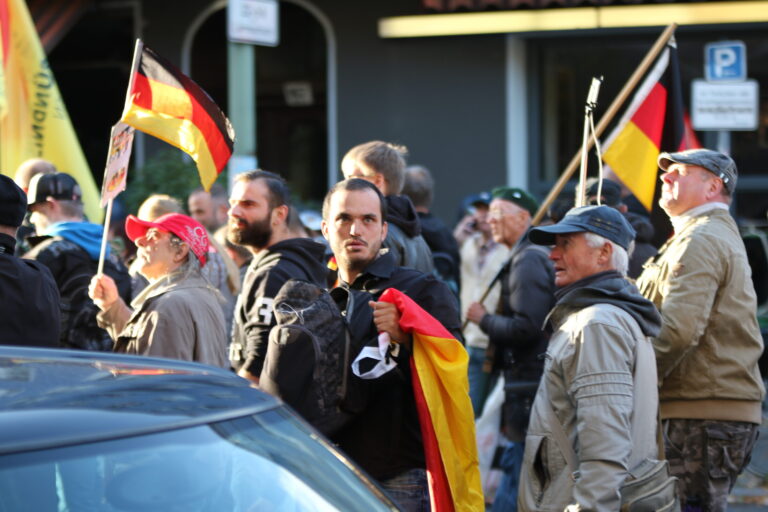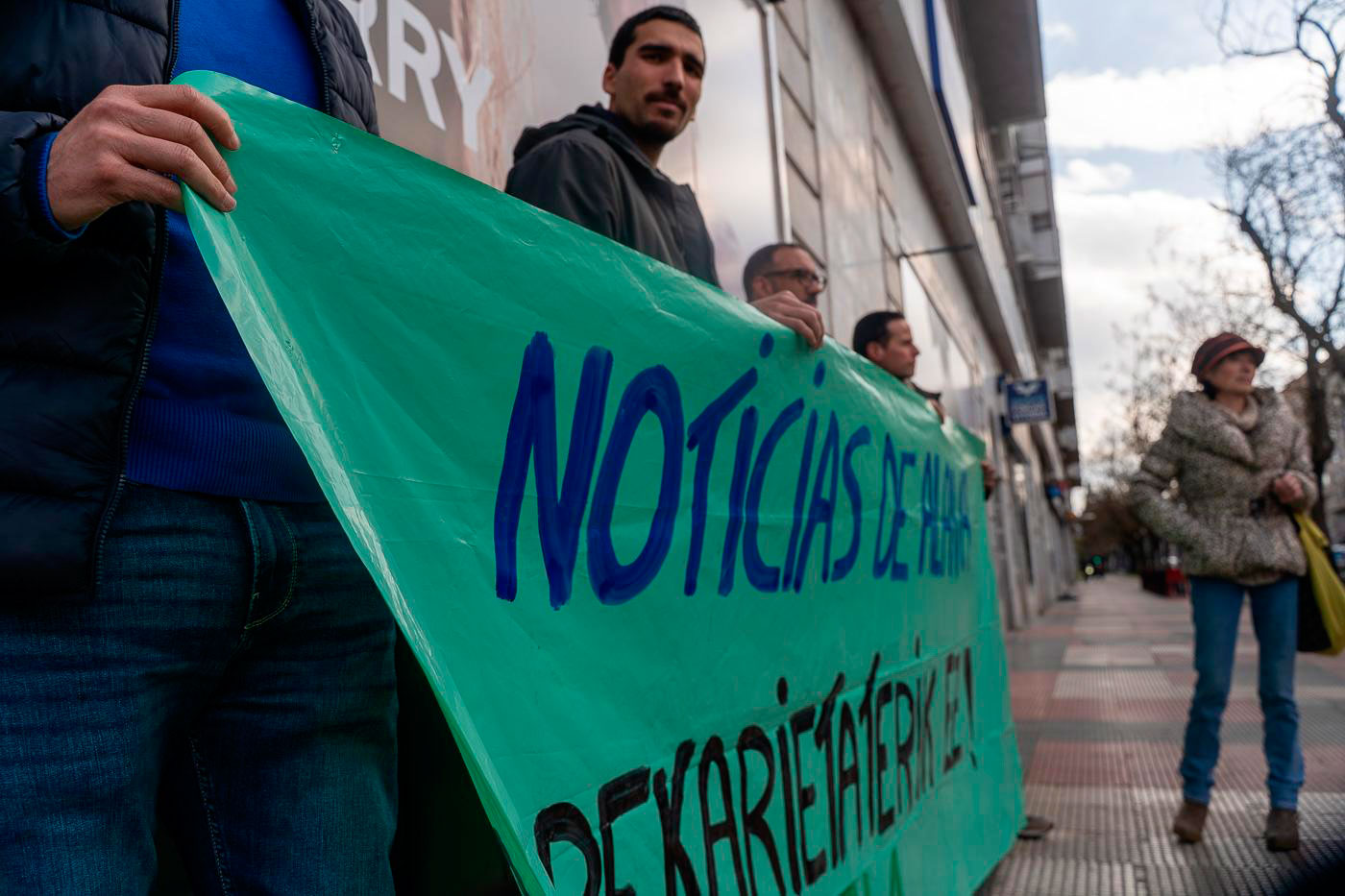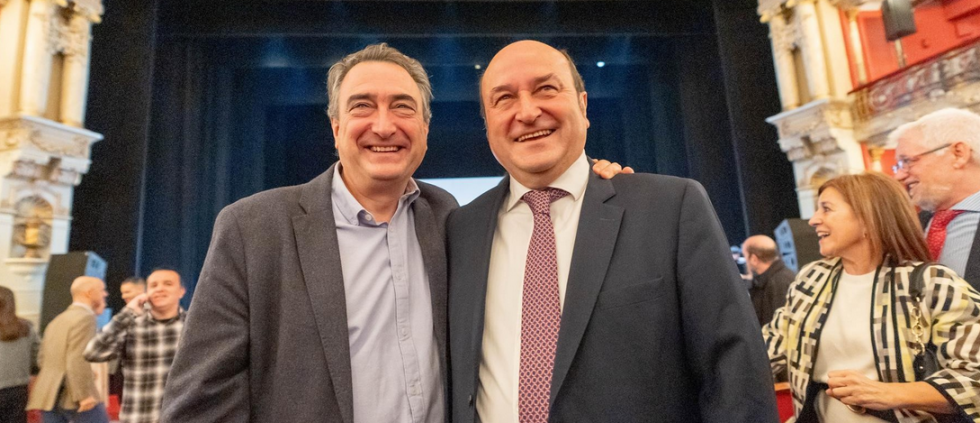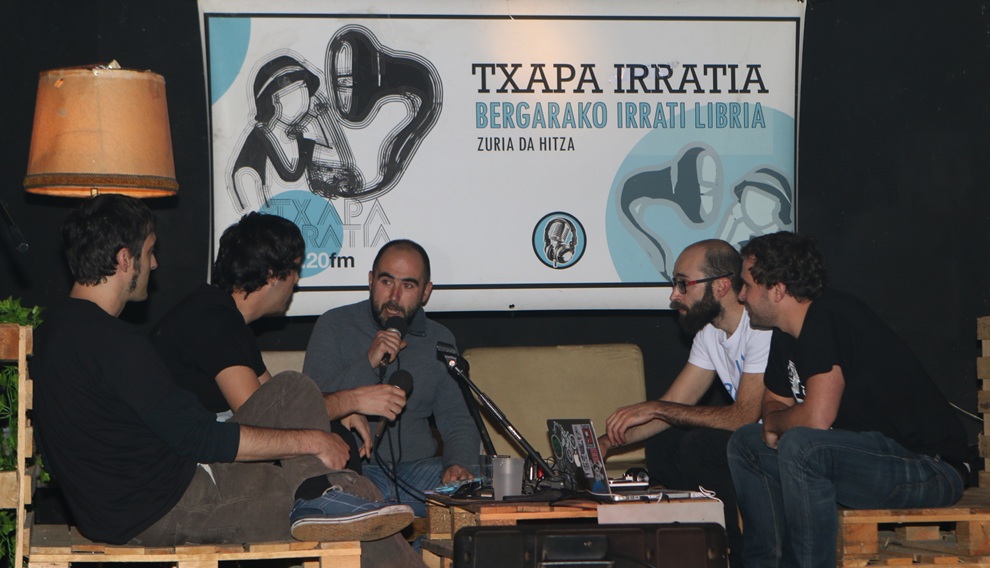Process against the neoliberal media management model
- The hegemonic media has become factual powers. The idea of “information is power” was well understood by banks and multinationals that long ago joined the management boards of the communication sector. It's not a joke, it's a cross-sectional information, a vital element for life. Anyone in the world makes any decision always according to the information they have. And in particular, who is moving most of the information that comes to citizenship? What role do the hegemonic media currently play? What role can independent journalism play in the transformation of society? Although relations of strength are very unequal, in this sector, called the fourth power, more and more independent media are working outside the logic of the market. In recent times, sovereignty – in plural – is gaining strength as a political concept in sectors such as food sovereignty, energy sovereignty, technological sovereignty, housing sovereignty, financial sovereignty, cultural sovereignty, health sovereignty... Sovereignties, a proposal against capitalism is a good reference to work on the issue. The projects that will deepen daily life, in the communities, in each of the aforementioned areas propose the progressive and collective construction of political sovereignty. In these schemes, therefore, we will talk about information sovereignty, understood as a process of transformation of the current media landscape.
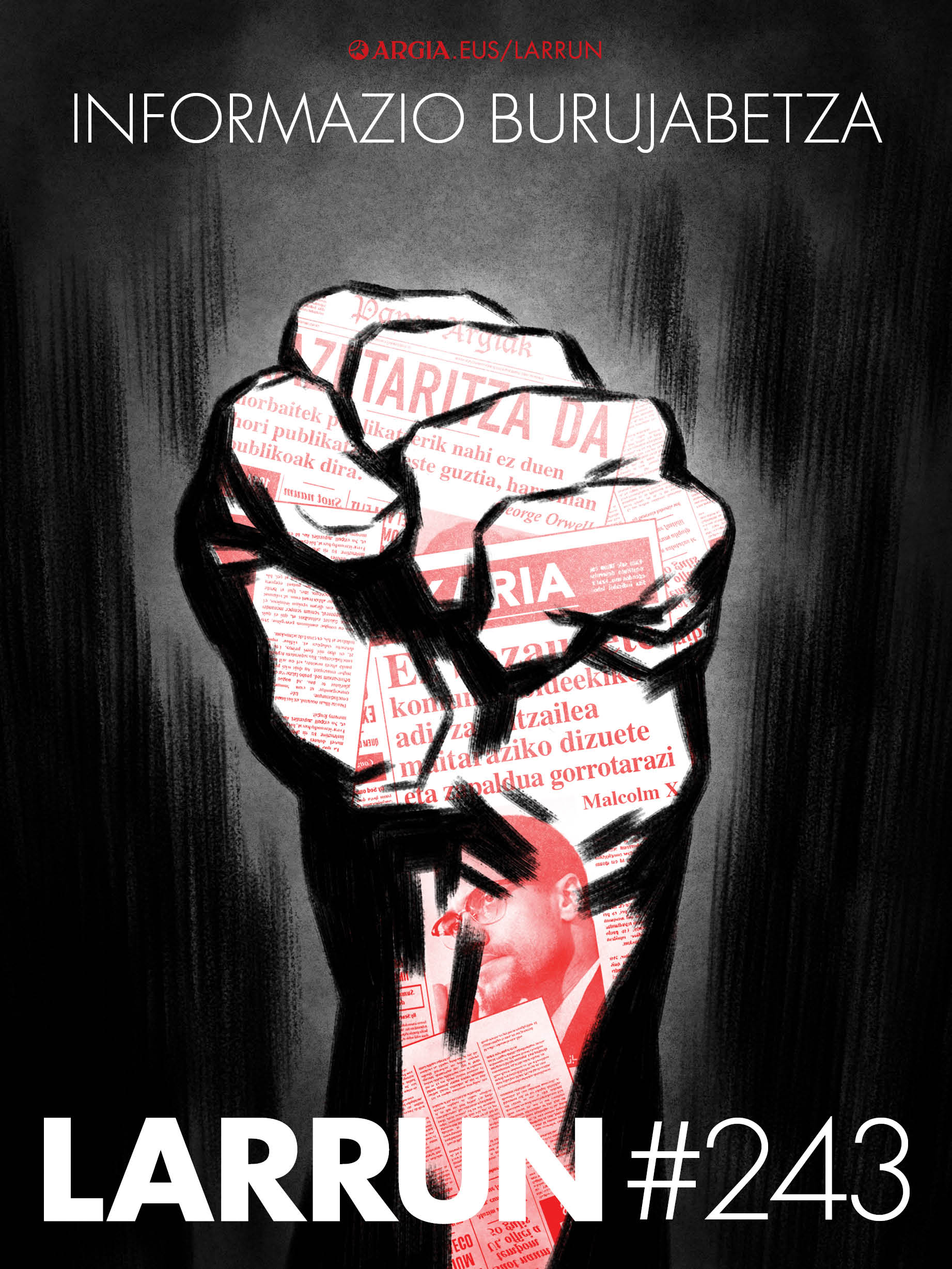
"Is this the beginning of something new?" has asked more than one. On Boulevard de Donostia-San Sebastián, more than 3,000 people have met to participate. These are eight young people who have been taken to the prison order issued by the Spanish National High Court. Fall on April 18, 2013, with fatigue, nervousness and joy. Two years after the popular wall that prevented the arrest of Aurore Martin in Baiona, in the Gipuzkoan capital the ball is increasing. In the early morning of the following day, hundreds of Ertzaines will come to evict solidarity and hit the compromise. However, no one yet knows how the thing will end, that is why the square named Askegunea has become an important center of attention.
Since this protest took place, the silence of the media near the power has been remarkable. Within a week, social networks are burning and the international media are reporting on the subject – the media of Catalonia, Italy, Germany, the Spanish State, the French State, Greece, Ireland and Russia – the hegemonic in the Basque Country still do not recognise relativity, at least until the end. Messages that people have written denouncing censorship can still be found on the Internet (I, II, III, IV, V, VI, VII, VIII, IX, X). Also the column written by Aritz Galarraga in Berria. “The informations of the last few days are being anthological, etceable and able to show in the future what is not journalism in school universities. It is scandalous that ETB informative reports follow an event such as that of the Gipuzkoan capital. It’s better to say, the lack of continuity,” he said against political decisions.
.jpg)
Disinformation is an action or technique – according to Wikipedia’s definition – aimed at keeping people in ignorance or incaution about a data, argument, theme, news, fact or information. The main objective of this technique is to silence information in favor or against the disinformant. Control and manipulation is one of the most powerful forms of power that higher-level authorities have access to, and this practice is older than the south wind.
To whom do the media serve?
What happens when half-high or high-end information is not in the taste of factual powers? Do they reach citizenship? What and how does it come? Why are there sectors of society - let us say employers - that have a much greater presence in the media compared to other groups of citizens? How is this information treated? Who are the hegemonic media and, above all, what interests do they defend, of the citizens or of some minority elites?
“I’ve always thought that journalism has to be ethical but hard,” says Wikileaks director Kristinn Hrafnsson, who published Pello Zubiria in ARGIA as a radical journalist or not a journalist, according to the report. The ideals of our youth time would surely be considered radical today. So there was no talk about journalism having to be somehow neutral. You have to commit to ideals to deserve the honor of this trade.”
On the case of Iceland, he said that “all financial matters were entrusted to journalists who are specialists in this field”, who often agree with bankers and elite experts. “We have failed. We have not listened to the warning signs, as journalists we have a lot to analyse about our work,” says Hrafnsson.
.jpg)
In the Fort Apache program that you can see on the Internet, who controls news agencies? are the data given in the debate:
In the Spanish state, the RTVE, Mediaset and Atresmedia communication groups gain a share of about 90% of the national audiovisual market and each day control three-quarters of what the audience sees. In the case of radio stations, SER, Cope and Onda Cero decide what 80% of the audience listens to at the state level and control over 90% of the market. Although the Spanish State has one of the worst notes in the analyses of media concentration and independence, the problem is worldwide. In the two-thirds of the states that make up the European Union, four communication groups hold 80% of the country’s media ownership. In addition, much of the news media is produced by news agencies. To this must be added that most media and citizens use centralised social networks to inform and that these are from some private multinationals. The power to condition the information of so many citizens was never so great, and at the same time it was never in so few hands. And that has consequences.
Noam Chomsky says media manipulation does more harm than the atomic bomb because it “destroys brains.” According to the American linguist and thinker, “the goal of mass media is not to inform what happens, but to shape public opinion according to the corporate power agenda.”
In short, deciding what the news is and what is not a great power and, above all, two players have it: international news agencies and the media.
The world dancing to the rhythm of agencies
They're transnational information. Most of the news that is broadcast every day around the world has three news agencies: the main one is the Associated Press of the United States. It has 3,200 journalists distributed all over the world. About 1,300 media outlets publish their contents. The second is Agence France-Press (AFP), which last year had 2,400 journalists on its staff list. Every day over 3,000 news, 2,500 photos and 200 TV news are sent to media around the world. Reuters is the third English with over 2,500 journalists and over 600 photojournalists. In 2008, it was bought by one of the 25 richest people in the world. They are machines that influence the world, and the latter, for example, reports in English, French, German, Italian, Spanish, Portuguese, Russian, Fused, Arabic, Japanese, Korean and Chinese. Most of the time, they focus on the most relevant current news from countries where journalists are located and, unless they are exclusive, they work according to the media agenda of that country. For example, nowadays, foreign journalists usually write in Madrid or Paris news about political issues of Euskal Herria, as indicated in the beginning of the articles.
1850.eko, at the time of the expansion of capitalism, agencies opened up to the world in the grip of colonialism. The advancement of technology applied in the field of communication, such as the creation of telephones or satellites, accelerated the flow of information. The former were the States that had colonial interests, agreeing among them the distribution and respect of the areas of influence. Later, most states have created theirs. Basically, although thousands of good and serious journalists work in these agencies, it is undeniable that all of them are the culture of those countries and the instrument for transmitting values. In addition, there are other agencies that work from liberating values, such as the Cuban Latin Press that deals with South American news, that try to disseminate the news from Africa and Asia from the perspective of the continents in which they are produced, or the Inter Press Service (IPS). The motto of the latter is: “Journalism and communication for global change”.
As far as  Euskal Herria is concerned, the news that is being produced in Iparralde and that may be of international significance – we shall shortly be seeing in G7 Biarritz – will certainly be dealt with by the AFP to which we have referred. The most relevant events of Hego Euskal Herria focus on the history of EFE, the Spanish one. The agency was founded in Burgos in 1939. The founder was Ramón Serrano Suñez, brother-in-law of the dictator Francisco Franco and minister of the Interior of the Regime. In a picture for history, it appears to give Hitler his hand. In 2011, it had more than 1,300 employees and, according to the latest public figures, it had made a hole of more than EUR 5 million. Journalists have subsequently denounced redundancies and precarious conditions in various delegations. The main shareholder is the Spanish State, while the Banco Santander and La Caixa, among others, also have a part of the property.
Euskal Herria is concerned, the news that is being produced in Iparralde and that may be of international significance – we shall shortly be seeing in G7 Biarritz – will certainly be dealt with by the AFP to which we have referred. The most relevant events of Hego Euskal Herria focus on the history of EFE, the Spanish one. The agency was founded in Burgos in 1939. The founder was Ramón Serrano Suñez, brother-in-law of the dictator Francisco Franco and minister of the Interior of the Regime. In a picture for history, it appears to give Hitler his hand. In 2011, it had more than 1,300 employees and, according to the latest public figures, it had made a hole of more than EUR 5 million. Journalists have subsequently denounced redundancies and precarious conditions in various delegations. The main shareholder is the Spanish State, while the Banco Santander and La Caixa, among others, also have a part of the property.
José Bautista, currently a collaborator of La Marea and The New York Times, reported what he saw as an EFE scholar in the aforementioned Fort Apach debate programme. “I was writing the main news of the day from Brazil. This news was going to the continental table of Colombia, from there to the headquarters of Madrid, and ten minutes after I sent the news I found the title on Google and found it published in the media of 20-30 around the world, literally including the news. That is power.”
The media has the last word
The media has another power: to present every day to the citizens a sample of what is happening in the world. To do this, each day thousands of news items are selected and decided on their importance, position and space. Although tradition is gradually changing, the media are usually very hierarchical structures, and the main positions of power are held by men. There are not few voices denouncing the precariousness of the trade, the partisan use of public media or the violations of rights implied by the laws against freedom of the press and expression.

To the detriment of the right to information, many of the media that dominate the world have become business. All you have to do is turn on television with the greatest impact and see the superiority of the gigantic machines of making money and transmitting hegemonic values by offering free time. If we look at the hegemonic newspapers in the area, we can identify a trend that is repeated all over the world: the means that, despite losing one fortune each year, are still on the streets thanks to big shareholders and public money, effective instruments to influence public opinion.
“The hegemonic media are controlled by the banks, which are the only ones that have the three decisive keys: they are shareholders, they negotiate monetary credits and they advertise.” Journalist Pere Rusiñol asked in the introduction of the book Paper Wet: “Does anyone believe that the media owned by the bank can be informed of the independence of evictions, pensions, preferred or the rescue of the bank?”
In addition, the practices of the false media that disinform without shame about the power, and which give rise to this information, are a shame of the trade. They do not respect the journalistic deontological code. The first point reads as follows: The first task of every journalist is to respect the truth and the right of the public to receive truthful information.
In this regard, according to a survey by the Oxford Institute in the Spanish State, 25% of those questioned said that “it was happening” for the news, because “it is negative news” or do not believe in the media.
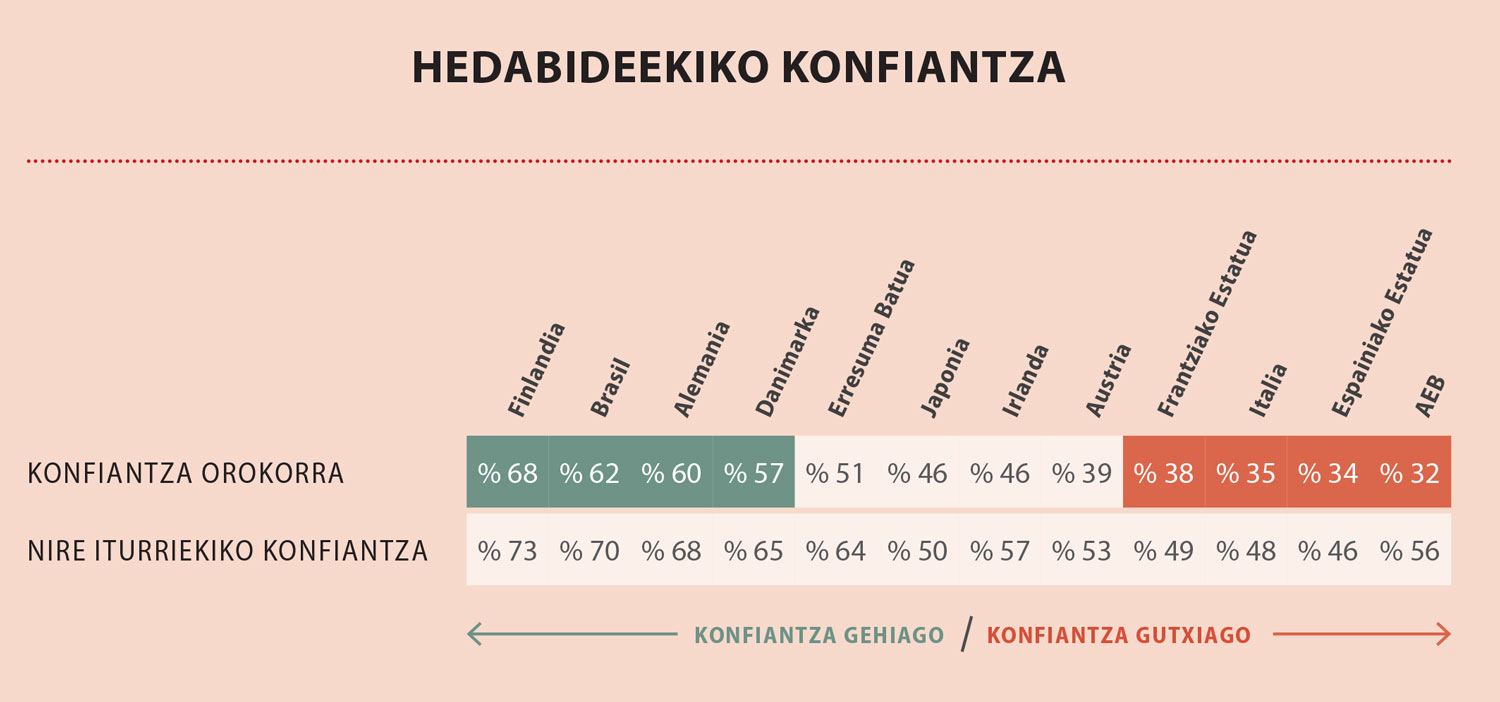
It goes without saying that, despite the political-cultural role that we are referring to the hegemonic media, there are also projects that make a proper account of today. In the past, there were also citizens concerned about the media landscape and created the horizontal media. Currently, in this panorama of many and very few media, there are also media that keep their agenda and disseminate information that complicate the hegemonic story. Eldiario.es As pointed out by Ignacio Escorial, director of digital publishing, if there is plurality, every citizen can find a means to somehow represent their political opinion. The problem is that the playing field for the media is not fair or equal: the institutions allocate most of the public money to concrete private media, and the data show that without a transparent criterion of money sharing. For example, in 2017, Cadena 100 achieved 95,000 listeners in the CAV according to CIES, and obtained 24,000 euros of audience. According to the same source, Onda Vasca, from the News Group, was heard by some 35,000 people, which was paid 200,000 euros of public hearing. The Internet, on the other hand, has undermined the privilege of some media to tell the main truth and has facilitated the existence of multiple references to a fact that allows citizens to be informed without the mediation of the media.
This has also been instrumental in understanding the deep credibility crisis of the hegemonic media – although some try to christen the “journalism crisis”. Since a global picture cannot be taken of the panorama, we can say that, focused on popular construction and transforming values, the creation of new media critical to power, many of them digital, is gradually taking place.
In the French State, it is known that the country ' s main media outlets include the country ' s greatest fortunes. The magazine Basta summarized the report with the following title: The delusional power of the ten billionaires who own the French press. In the book Sauver les médias, edited by the economist Julia Cagé, the raw data of the hexagonal media are collected: In 2012, the newspapers France-Soir and La Tribune were closed and the newspapers La Tribune were injured. In 2014, Libération was saved from the situation of fair insolvency administrator, and in 2015 a third of the workers were dismissed. Le Figaro has multiplied the “voluntary casualties” and Sud Ouest has reduced the workforce. This is a sign of the phenomenon that is taking place around the world.
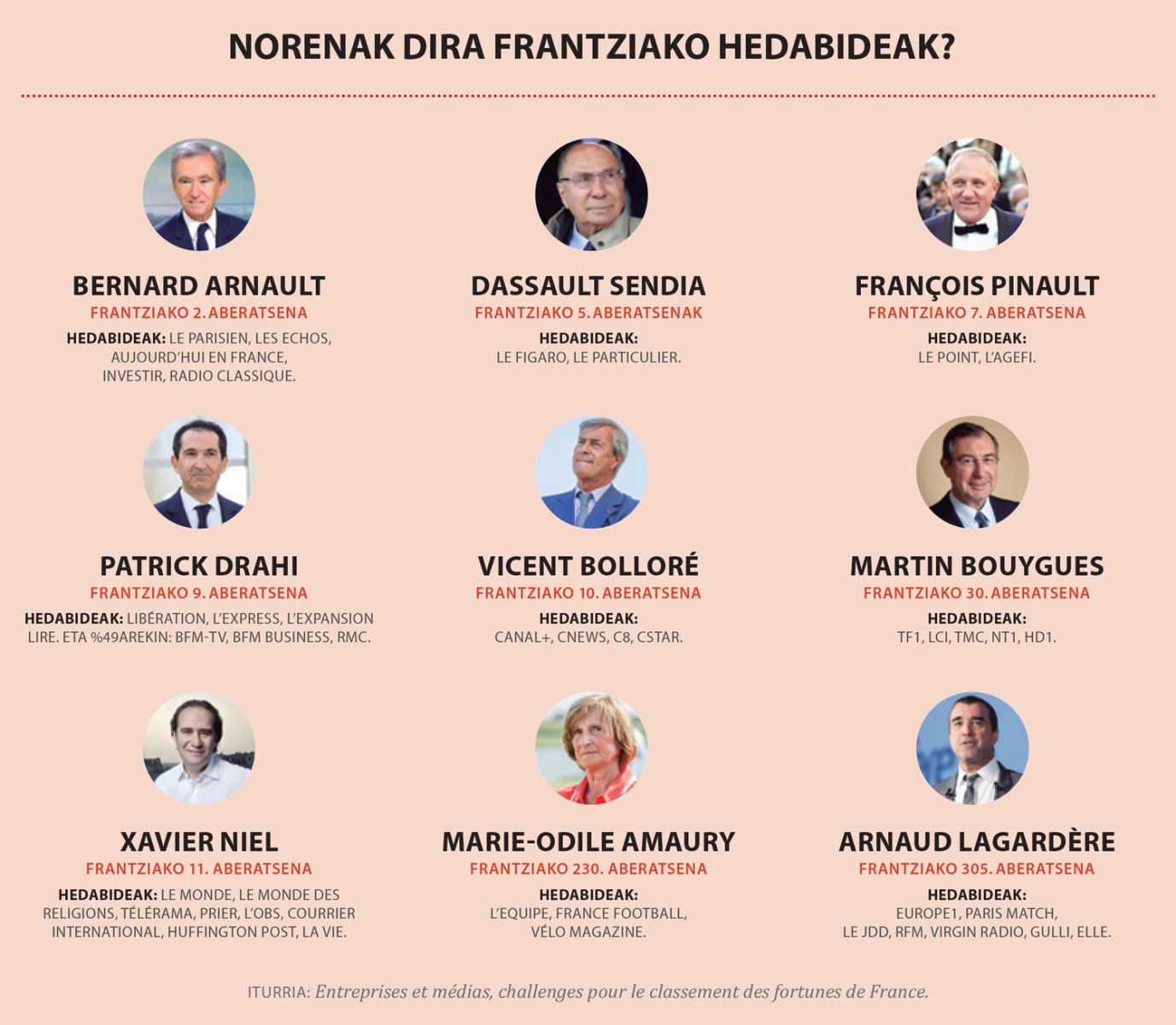
The long hand of politicians
The current media ecosystem has not fallen from the sky, political power moves its wires. The laws and public funding of the years have direct consequences. For example, the CAV institutions subsidize the promotion of Euskera in the media (EUR 4,875,000 in 2017), but at the same time, through institutional advertising, subsidizes more the Spanish-language media (EUR 5,749,974 in 2017). To this we must add that, in exchange for publishing some news in Euskera, it is those who receive most of the money from the Euskera promotion exchange in the network. In Galicia, pp leaders have been doing the same for many years: Most of the line to promote Galego on the net is donated to the Spanish media in exchange for some news.
The hegemonic media, among others, earn in the product thanks to the amount of public money they receive
About one million, 963,957 euros were donated by the Basque Government to El Diario Vasco in 2017, and another 399000 by the Council of Gipuzkoa. In addition, the ads from the City Hall of Donostia-San Sebastián by City Hall, from the ministries of the Government of Spain, or from entities such as Euskotren or the Real Sociedad are added. Every year several million euros to the public, to which it belongs and to the information giant that belongs to the banks. Like the granting of subsidies to Iberdrola. The same in Bizkaia and Álava with El Correo, in Iparralde with Sud Ouest. This is a trend that is repeated all over the world, in which the hegemonic media, among others, are imposed thanks to the large amount of public money they receive.
.jpg)
More and more voices are denouncing that the distribution of institutional advertising is not done with transparent criteria. If this item were to be used in favour of the right to information for citizens and distributed equally among all, the risks of clientelism would be avoided and communication projects that are being carried out with fewer resources would be significantly strengthened. However, this scenario is a radical change, as the privileged media that are in red numbers would no longer receive hundreds of thousands of euros a year. This is another key to understanding the counter-stance adopted by these media when a political force that can change the situation comes to send in the institutions.
In addition, Governments distribute the frequency and licences of the country ' s television and radio stations. The history of the radio Euskalerria de Pamplona is paradigmatic in this sense, just as Bilbao Hiria is becoming the radio. Both radios have been condemned to work without a license for years – with the government of the change that Euskalerria Irratia achieved in the previous legislature – because the radio channels produced from Madrid – in Spanish – to the citizens of this territory have a significant weight in the waves.
Finally, we must not underestimate the privatization practice on the right. In Mexico, in 1992, public television was sold in the country, and in Argentina workers report that Mauricio Macri is working on it. In Brazil, Jaïr Bolsonaro has included among his plans the making available to the multinationals of 147 state-owned companies, including public television, for the expenditure it entails for the State. In the Spanish State, the law on the privatization of regional television was approved, which was already done in Murcia and Navarre.
Information sovereignty
“All journalism looks for the label of independent. However, relations with the centres of power and their publicity, as well as with the political parties, must be clearly defined; attention must be paid to the formulae used by power to break journalistic independence. It’s important for this new era open over the Internet,” says El Salto journalist Pablo Elorduy.
In their words, the independent media has a role to stop playing the role of “provocateurs” and give information impetus to other processes. “For example, basic processes that seek the redistribution of wealth; the denunciation of the large corrupt infrastructures underway; and to show citizens other possible worlds, societies and neighborhoods. The role is absolutely political.”
.jpg) To do this, the Internet is a large open window on the wall. Until recently, it was unthinkable to escape the dependence of oligopolies on information and directly access information sources around the world. However, the network has turned the business model upside down and the decline in private advertising has left many of the media very touched. To this must be added the growing mistrust towards the hegemonic media or the difficulty of profitability of the investments needed to generate information and maintain the independence of journalists. In the midst of the storm, there are many of the media that currently have a great deal of weight in the information ecosystem.
To do this, the Internet is a large open window on the wall. Until recently, it was unthinkable to escape the dependence of oligopolies on information and directly access information sources around the world. However, the network has turned the business model upside down and the decline in private advertising has left many of the media very touched. To this must be added the growing mistrust towards the hegemonic media or the difficulty of profitability of the investments needed to generate information and maintain the independence of journalists. In the midst of the storm, there are many of the media that currently have a great deal of weight in the information ecosystem.
“An important detail: it is not a new crisis. It is not a consequence of the Internet or the 2008 crisis. We tend to forget, but with every new technology, first the written press, and then other rival media outlets have always protested, launched an alert and announced a certain death. It is true, however, that in recent years the crisis has dramatically accelerated. Traditional media is threatened, desperate. The information is collected, transmitted and multiplied, but it is repeated without paying. On his death feast, the media stumbled and collapsed.” This is an exhaustive analysis by economist Julia Cagé.
The decline of these hegemonic media is very strong in the data. Taking as an example the newspaper El Diario Vasco de Vocento de Gipuzkoa, it has gone from selling 94,000 paper copies in 2004 to selling 48,949 in 2017, losing almost half. They have not managed to curb the trend, according to the data provided by the OJD agency.
Prentsa died, long live the press! In the book, veteran journalist Pascual Serrano says: “The press is not in crisis, but some ways of doing journalism. Proof of this are the cooperative media that are overcoming the current recession with proposals and renewed forces.”
If it is not a great daring to put ARGIA as an example of the means to which Serrano refers, it should be noted that the centenary is being celebrated at a time when hundreds of new members are coming to support the project. In Euskal Herria it is the Dean publication, the only one that has survived the century in the history of journalism entirely in Euskera. As Elixabete Garmendia recalled in his centennial article of ARGIA, only two media outlets face it: It was founded in 1903 by the Diario de Navarra and later El Pueblo Vasco would become El Correo Español. The rest have a shorter journey. The ARGIA working group launched in 2016 a unique subscription model in the world, with the aim of asserting the right to information for all citizens and making it possible. So that the economic situation is not an obstacle to anyone. In these times when everything is on sale, so that information does not become a privilege. That’s why anyone can make the financial contribution they deem appropriate to ARGIA, and back, pick up whatever they want: weekly, every two weeks, every month, follow on the internet and not take on paper... With solidarity as the axis, the community stands here. This is an approach that, in addition to guaranteeing the independence of the project, wants to contribute to guaranteeing the right to information for those who cannot afford it.
And what can be the transformative foundations for independent journalism towards the sovereignty of information? To try to do honest journalistic work, to prioritize the right to citizen information to other interests, to elaborate its own agenda, to focus on the exchange with the community that underpins the project, to search for horizontal and feminist internal organizations, to promote values such as solidarity, to develop technological sovereignty to reduce the dependence of multinationals, to take measures to reduce the environmental footprint of the environment, to promote a transformative social economy, to feed the network among independent media, and to promote free culture. Therefore, inform citizens of the initiatives and alternatives that, in addition to the control of power, are emerging to carry out their lives in a different way. And to do all of this in an oppressed language is to feed an invisible cultural map for official administration.
Next, the reader will find the way in which workers see the landscape in various media formed as owners or cooperatives.
So how would we summarize what information sovereignty is? In the book Sovereignty, a proposal against Capitalism the definition of food sovereignty is transferred to the realm of communication: the sovereignty of information is the process of fighting the neoliberal model of media management.
Framed within a broader process of social transformation, it is impossible to try to change the information model, for example, without questioning the cultural model. For the freedom of universal information, against manipulation and disinformation, the concentration of power faces pluralism and equal opportunities. There is a whole way, without asking anyone for permission, to defend the sovereignty of the citizens.
Independent journalism for transformation
A popular media, de facto, does not promote transformation. There are not few projects that intend to make the way from the point of view of social transformation. However, transformation is such a diffuse term that it is necessary to make a precise political analysis: in addition to the content involved, we must analyse the concrete social relations of the media, the economic process that allows information to be generated and the internal organisational structures.
It is impossible that this leather has no universal vocation to be put on the table. It is clear that there is not the only way to do independent journalism. Every community and project makes its own way. However, there are important factors that we have asked for help from the following media to identify: Aiaraldea, Pikara Magazine, La Directa and El Salto. In these media, workers are owners or cooperatives and present themselves as media in favor of social transformation.
La Directa, Catalan Countries, 2006
.jpg)
Ownership: They use the cooperative formula as a legal structure, as it is closer to their values. It is the media owners who do and consume it. They are a consumer cooperative, that is, in the assemblies 51% of the votes are from the subscribers. They practice the opposite of the power relations created by the shareholders or owners of the mass media, promoting collective ownership with the philosophy of “one person, one vote”.
Organisation: They come from the assembly tradition, they have no section head or section head. They use figures from coordinators who try to work from the horizontality to invigorate sections and spaces. They have three main assemblies: weekly content, monthly organization and three times a year of the cooperative's General Assembly, with a medium-long term strategy.
Content: They try to keep their own agenda. One of its main functions is “to give voice to those who do not have a voice in traditional media”. In his words, political and economic power has a great influence on media agendas, specifying what is publishable and what is not. They claim that journalism is done from below, making rigor, contrasting data and honest journalism work.
Advertising: The media doesn't bite the hand it gives them to eat. It is difficult for a media outlet to question the practices of a great advertiser, which provides resources that are very important to him. The cooperative economy and social initiatives are the main advertisers.
Financing: 75% of the income is obtained through subscriptions. The statutes state that access to advertising cannot exceed 15% – currently 7% –. In this medium of communication you cannot predict anyone, advertisers must meet the ethical criteria that they have collectively agreed upon. This means explaining the importance of subscriptions.
Dissemination: Despite the noise, with social networks, counter-hegemonic journalism has the opportunity to reach many people. In any case, we have to be careful because social networks are in very few hands. They have organized a system of volunteers for the distribution of the journal.
Pikara magazine, Spanish State 2010
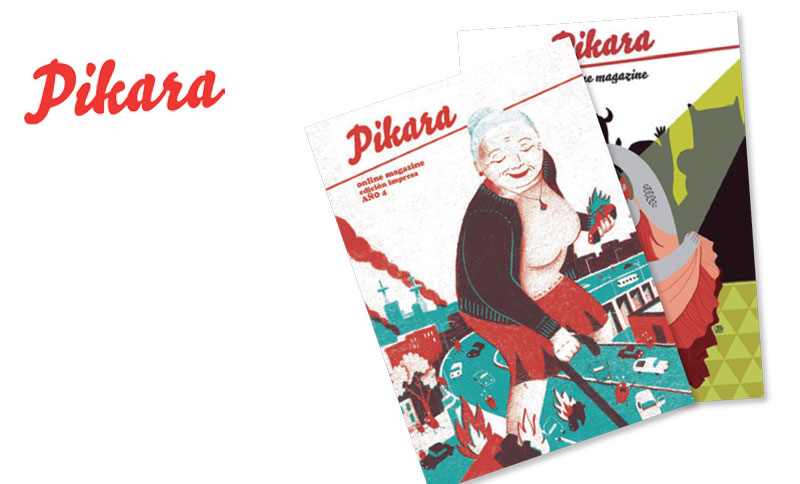
Ownership: The reader likes the model of consumer groups more than that of being the owner of the environment: the consumer group pays for products and work to an agro-ecological producer, but it is not for that reason that he owns his land or his company. They use the figure of “friend of the picardy”, a group of readers who commit to make an annual donation.
Organisation: Although the traditional hierarchical structure was initially established, it was decided to modify it. The workers who came forward in the project decided that they would be the coordinators, all with the same level and the same salary. Now the group grows and seeks answers to new questions. A change is being made towards a model that will be the drafting, the main point of decision. As a feminist communication medium, they are working on the idea of putting care at the center of a media and have created roles to balance the invisible tasks performed by their members.
Content: They try to work according to their own agenda, both the feminist movement and other social actors. Although they deal with current news, they do so with the intention of offering a different view and a calmer journalism that fosters reflection. Faced with the normalization of violence, the trivialization and the expectacularization of the hegemonic media, they tell stories of resistance and life alternatives.
Advertising: They give up advertising by large companies, invasive advertising, publishing, funding by foundations set up to launder money or big speculators.
Financing: Those who do not have equity or private investors need a community that puts money. The website was designed with 3,000 euros and without the need to request a loan. In the first four years, the National Liberation Army came forward with a militancy to cover the income they earned from their collaborators. Normalising the non-exaggerated work has put the difficulties in asking for public money on the table. Male journalists have easier access to the spaces of power and influence and get financial support for their projects. Pikara Magazine workers also give talks, workshops and so on to get money.
Participation: In the comments of the articles, people were writing at first, but hate messages and spamaga were pulled out. Now they have a forum, they're very successful, and moderation is easier. It was born as a project at the level of the Spanish State and South America, so Spanish is the main language. They also report in the following languages: Basque, Galician, Catalan, Aragonese and Asturian, sign language and Easy Reading. When readers send papers, they suggest that they can do so in those languages.
Dissemination: They are concerned about the almost total dependence of the media on companies like Facebook and Google. How do you talk about information sovereignty and rely on your algorithms? Is it possible that an alternative means pays Facebook to promote its contents? It is frustrating to see that the same issues are always considered, in the face of other historical resistance. We are promoting the newsletter via email. They have collaborations with other media to achieve visibility and expand content. They have a blog eldiario.es, some pages participate in El Salto as a source of information on major television channels using feminist discourse.
El Salto, Spanish State, 2017
.jpg)
Ownership: The media is that of partners and subscribers. It was jointly created by 20 local media scattered throughout the Spanish State. They do not accept financing from large companies. It is the workers themselves who have laid down the rules and they all have the same pay. With these kinds of decisions, they want to draw how the media can be next to the people who drive social transformation.
Advertising: They do not support Ibex35 advertisers. They ask if you can advertise with Telefónica in the media that want transformation. They say it's possible, but if you do it without it, you study where people's borders are to organize themselves out of power and where journalists' borders are to report against that power.
Organisation: Information sovereignty is or should be related to the transformation of other labor relations. In their communication medium, it is equally important to value the loyalty partners of the members, those of the administration or those who sign in the reports and want to face the classism that has dominated the redactions. Hego Euskal Herria's edition is called Hordago.
Content: The information being disseminated by the media is fundamental to keeping those in power. It serves to organize society, to introduce new narratives and problems, sometimes diverting real problems. The institutional advertising that separates it from the logic of clientele prevents free competition between the media.
Information Sovereignty: The goal is to avoid being Facebook, Atresmedia or Google servers, as well as managing your own data. In the last elections, the anti-occupation speech has been imposed in opposition to evictions. We know who wins like this. It is also informative sovereignty to abandon the frameworks of thought that have imposed on us. If there is not much talk about evictions in the newspapers, do not forget, it is the banks.
Aiaraldea, Aiaraldea, 2010

Ownership: It's a cooperative. It belongs to the members of the community of workers and partners.
Financing: Although it is community or cooperative property, as they receive money from institutions and companies through advertising or sponsorship, they are dedicated to measuring the place where to place the line between critical work and possible conflicts with these agents. However, the media is trying to be as free as possible both economically and informally.
Organisation: It's quite horizontal, and journalists respond to the principal, the other comrades and the community. In addition to the work of journalists, they have a network of volunteers organized around the environment, either for distribution or as a source of information.
Content: Local media. They have an editorial line that promotes vasquism, feminism, transformation and interculturality. They keep track of the agents who address these issues, but try to reflect these values in a transversal way also in their information.
ARGIA, Basque Country, 1919

Ownership: The SAL has a corporate structure and the workers – and the companies of the Ametzagaiña group, in a low percentage – are the owners of the company. To decide which line to follow as a means of communication, what to invest in, how to act in certain situations, decisions are made between the partners. Philosophy is “one person, one vote”, but consensus is sought in decisions.
Organisation: In recent years, the horizontalization of internal structures has been deepened. The same wage was established, together with the sharing of responsibilities. Besides the fact that workers are organised by sections – drafting, selling, administration – they are also organised by working groups to carry out the tasks of the whole company. In each working group there are three sections for each space to have a complete view. They understand integrated work in the way of life. In practice, ways are being sought to put life and care at the centre to cope with the sexual division of work. From the conviction that the editorial line is not only what a means of communication counts, much attention is paid to practices in the workplace.
Content: It has a line linked to values, not political parties, agents or other points of power. It tries to have its own agenda, in contact with its own sources and with the social and cultural agents working in the transformation of this society.
Free licence: Disseminate everything created with free licenses, as the aim is to disseminate the content. It argues that Copyleft licenses allow content sharing and multiplying forces as a linguistic community among the public media.
Financing: The main income is the economic protection of the community. To keep the project economically, products are taken out, constantly working on diversification. In addition to receiving the subsidies that legally correspond to him for his work in the normalization of the Basque Country, he is one of those harmed by the distribution of institutional advertising by the Basque institutions.
I have to confess a sin here. Four years ago, I introduced a new habit into my life: on Sunday nights, I began to watch the ultra-right television channel CNews, which spreads continuous "information" like a cannon of shit. What was at first half an hour a week, has at any given... [+]
Martxoaren 14an Donald Trumpek agindu exekutibo bat sinatu zuen, hainbat berri agentziak jasotzen duten diru kopurua asko murrizteko. Kaltetuetako bat United States Agency for Global Media (USAGM) izan zen eta, ondorioz, Voice of America (VOA), Radio Free Europe/Radio Liberty... [+]
2022ko ekainaren 7an, Directa-k serie luze bateko lehen polizia infiltratuaren kasua argitaratu zuen. Martxoaren 5ean, Belen Hammad fikziozko izena erreta geratu zen, polizia-argotean dioten bezala. Jada hamar dira Directa, El Salto eta El Diario-k azken hiru urteetan argitara... [+]
USAIDen inguruko txolopotearen ondoren, espero beharrekoa zen. Baina, hala ere, urte askotan haien jarraitzaileak izan garenok, samin-puntu batekin hartu dugu albistea. Martxoaren 15ean, Trump administrazioak, kolpetik, erabat itxi baitu United States Agency for Global Media... [+]
Varsoviako Barrutiko Auzitegiak argudiatu du González jada ez dagoela Polonian, eta ezin dutela jakin noiz aterako den Errusiatik. Auzitegiak ez du kazetari nabarniztarraren aurkako bestelako prodezurarik abian jarriko.
Gaur abiatu da Bizi Baratzea Orrian kide egiteko kanpaina. Urtaro bakoitzean kaleratuko den aldizkari berezi honek Lurrari buruzko jakintza praktikoa eta gaurkotasuneko gaiak jorratuko ditu, formato oso berezian: poster handi bat izango du ardatz eta tolestu ahala beste... [+]
Alemaniako Poliziak asteleheneko gertakariaren arrazoiak "politikoak" zirela baztertu duen arren, 35 urteko Alexander Scheuermann Ring Bund talde neonaziko kide zen. Bi hildako eta hamar zauritu utzi dituen atentatuaren egileak sare sozialetan "gorroto mezuak"... [+]
Lan baldintzen "prekarietatea" salatzeko kontzentrazioa egin zuten asteartean egunkariaren egoitzaren aurrean. Abenduaren 2tik sindaura greban daude langileak eta mobizlizazioak "areagotzea" erabaki dute orain.
Urtea baino gehiago da Olatz Simonek –EITBko berriemailea Parisen, garaian–, orrialde hauetan bertan ohartarazi zigunetik Bruselak kazetariari lanbideaz erakusten dionaz. Eta halaxe joan gatzaizkio galdezka Amaia Portugali. Bruselan gure irrati publikoak duen... [+]
Langileek salatu dute zuzendaritzak ez diela lan baldintzen gaiari heldu nahi izan eta enpresak nahiago izan duela Gaztea Sariak ekitaldia bertan behera utzi, “horrek sortutako albo-kalte ekonomiko eta sozial guztiekin”, arazoari irtenbidea eman baino.
Joan den asteartean La Vanguardia-n argitaratutako artikuluan egin zuen proposamena Txema Montero abokatu bizkaitarrak. 30 urtez Deia egunkariko kolaboratzailea izan da eta lehenik hara bidali zuen bere artikulua, baina egunkariak ez zion argitaratu.
Hemendik aurrera egunkarian soilik "norbanakoen askatasuna eta merkatu librea" sustatzen dituzten iritziak jasoko direla adierazi du enpresaburuak. Iritzi artikuluen zuzendariak hedabidea utzi duela ere argitaratu du.
Egitarau mardula prestatu dute Bergarako irrati libreko kideek: musika, literatura eta tailerrak. Besteren artean, martxoaren 29an Txapa Eguna egingo dute.















